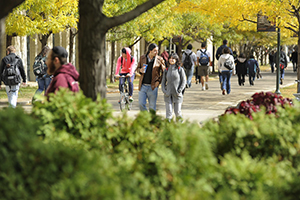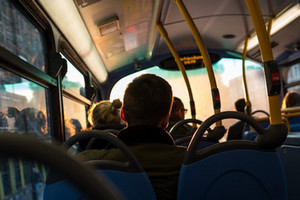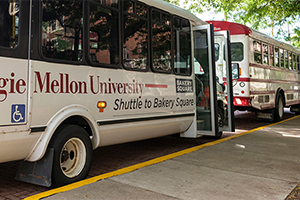Getting Around Pittsburgh
Carnegie Mellon is located at the junction of three major neighborhoods (Shadyside, Squirrel Hill and Oakland) and is within walking distance of restaurants and shops. Want to get around campus? Look for university shuttles or Escort Services. For traveling longer distances, you may want to consider using a bike, bus, car or rideshare. If you will be here for a longer period of time, you may want to consider purchasing a car.
Walking
 Pittsburgh is a pedestrian-friendly city, especially in the neighborhoods around campus, downtown and the East End. But there are plenty of hills, rivers and bridges that can make walking longer distances challenging, especially in the winter.
Pittsburgh is a pedestrian-friendly city, especially in the neighborhoods around campus, downtown and the East End. But there are plenty of hills, rivers and bridges that can make walking longer distances challenging, especially in the winter.
Most Pittsburgh neighborhoods are walkable, and walking between campus and your on- or off-campus apartment to grocery stores, pharmacies, dining or local entertainment options (shopping, movie theaters, etc.) is generally simple. For moving between neighborhoods or longer commutes, you may want to consider biking or public transportation.
Biking
 Biking is a great option for getting around Pittsburgh. The city has many dedicated bike lanes to encourage more people to bike to work or school.
Biking is a great option for getting around Pittsburgh. The city has many dedicated bike lanes to encourage more people to bike to work or school.
Tips for safe and courteous biking, routes, and equipment can be found on the Transportation Services' Bike and Wheel Resources.
Biking to Campus
There are multiple bike racks located throughout campus. You can also rent an individual locker large enough to store your bike, helmet and shoes through Parking & Transportation Services. Bike lockers are located in the East Campus Garage and Gates Garage.
Tip: If you plan on biking to campus, consider registering your bike with the university police to help protect against damage or theft. And always lock your bike!
Biking Around Pittsburgh
Bike PGH! is a local advocacy group that offers printable and interactive maps that show bike routes through city streets and public parks. Their maps also include notes from seasoned cyclists about the best routes or places to avoid. They also maintain a list of local bike shops, clubs and events and have previously partnered with on-campus groups to host free on-campus bike maintenance events.
BikeShare Options
POGOH is a public bicycle-sharing system operated by Bike Share Pittsburgh, Inc. The program allows you to rent a bike from any one of its locations across the city, many of which are located within just a few blocks of campus. When you're done, just return the bike to any POGOH station! To get started, register for an account via the mobile app or website.
Local Buses
 The easiest and least expensive means of transportation in Pittsburgh is the local bus transportation provided by Pittsburgh Regional Transit (PRT). Schedules for the various routes throughout the city may be obtained from the Information Desk in the University Center (on campus), by going to the PRT website or by calling PRT customer service at (412) 442-2000 and asking specific questions such as, "How do I get from CMU to the Waterfront shopping center?" Also, Google Maps provides very good public transportation information for getting around Pittsburgh.
The easiest and least expensive means of transportation in Pittsburgh is the local bus transportation provided by Pittsburgh Regional Transit (PRT). Schedules for the various routes throughout the city may be obtained from the Information Desk in the University Center (on campus), by going to the PRT website or by calling PRT customer service at (412) 442-2000 and asking specific questions such as, "How do I get from CMU to the Waterfront shopping center?" Also, Google Maps provides very good public transportation information for getting around Pittsburgh.
Student Bus Passes
All degree-seeking students are charged a PRT fee each semester. Your student identification card (ID) will show a small picture of a bus, which will serve as a bus pass, good for unlimited free use of the entire city bus system, including the "T" (the subway between downtown and the South Hills) and the inclines. Family members may find it economical to purchase coupons for a weekly, monthly or even yearly bus pass. Passes can be purchased on campus at the PRT office downtown or at local banks, department stores, and grocery stores.
Scholar Bus Passes
Visitors who are Carnegie Mellon staff or faculty employees (i.e., paid by Carnegie Mellon) and who are benefits-eligible will receive a CMU ID with a white bus icon on it. This will serve as a bus pass, good for unlimited free use of the entire city bus system.
For visitors who are not Carnegie Mellon benefits-eligible staff or faculty and for family members, the basic fare for bus service is $2.75 and $1.35 for a child 6-11 years old. Children under five ride free. The exact fare is required on all buses. Drivers do not carry change (fares are subject to change).
Sometimes it is necessary to take two buses in order to reach a destination. If this is the case, a transfer can be purchased from the bus driver. A transfer can be used to pay the fare on your second bus (including return trips if used within 3 hours of purchase). Transfers cost $0.50 for children under the age of 12 otherwise, it is $1.00 per person. Family members may find it economical to purchase coupons for a weekly, monthly or even yearly bus pass.
Passes and coupons may be purchased at the PRT office downtown or at local banks, department stores and grocery stores.
University Shuttles and Escort Services
 University shuttles and escort services are transportation options provided by the university to community members. To track CMU Shuttles or Escorts in real-time or to download the bus tracker app, visit the Bus Tracker website.
University shuttles and escort services are transportation options provided by the university to community members. To track CMU Shuttles or Escorts in real-time or to download the bus tracker app, visit the Bus Tracker website.
Shuttle Service
The shuttle service is a fixed-route, fixed-stop transportation option that is available to all CMU students, faculty and staff. Presently, the shuttle services Oakland and Shadyside. The Shadyside service is an option for students who wish to visit the East Liberty business, restaurant and shopping area. The Oakland service is a great option for students who also take classes at the University of Pittsburgh.
Refer to the university's Shuttle & Escort page for route links, specific route schedules and stops.
Escort Service
The university escort service is a transportation option that services Squirrel Hill, Shadyside and Oakland. This is an evening and nighttime service that operates from 6:30 p.m. to 6:30 a.m. The mission of the escort service is to get CMU community members home safely by transporting them to the intersection nearest their residences. Service is limited to a 1.5 mile radius of the main campus. The escort service is to be utilized exclusively as a means to get from campus to one's residence.
To view service areas or designated escort pick-up locations, visit the Escort Service page.
Getting Around by Car
 At times, you may also need to use a car for short-term needs. You can utilize rideshare options like Uber or Lyft, or you may choose to rent a car through a company like Zipcar. If you'll be in the U.S. for an extended period of time, you may plan to purchase a car. There are many factors to consider when determining what option is right for you.
At times, you may also need to use a car for short-term needs. You can utilize rideshare options like Uber or Lyft, or you may choose to rent a car through a company like Zipcar. If you'll be in the U.S. for an extended period of time, you may plan to purchase a car. There are many factors to consider when determining what option is right for you.
Rideshare
Popular rideshare services like Uber and Lyft offer both private or pooled ride services, which you can order from your smartphone. These companies are readily available for most of the Pittsburgh region and offer on-demand transportation to your destination.
For trips that will require more time, consider Zipcar. Zipcar is the world’s largest car-sharing program, offering self-service, on-demand rental cars by the hour or day.
Purchasing a Car
Owning a car in the U.S. can be expensive. There are ownership costs (purchase price, taxes, depreciation, finance charges, registration, insurance, license fees, parking, etc.) as well as operating costs (gas, oil, annual inspections, engine maintenance, tires, etc.) that you will need to consider before buying a vehicle.
If this is an option you are considering, you may want to explore resources such as Consumer Reports Magazine and Car and Driver Magazine. You can also visit CarEverything and NADA for more information.
Obtaining a Pennsylvania driver’s license may also be difficult. Do not purchase a car without first determining if you’ll be able to obtain a Pennsylvania driver’s license, which you must have prior to purchase. You can refer to the Pennsylvania Department of Transportation for more information.
You may wish to discuss auto insurance for the U.S. with your current auto insurance company at home. Automobile insurance rates for people who are new to the U.S. are usually inflated until a driving history has been established.
Be aware that parking on campus can be very difficult and costly to obtain, and parking in residential neighborhoods close to campus is limited.
Pennsylvania Driver’s License
You will only be able to receive a Pennsylvania driver's license if your I-20, DS-2019 or H-1B status is valid for more than one year. If you will be in the U.S. for less than one year and you would like to drive, you must bring your valid current home-country license and an international driver's permit (in English). Students and scholars who will stay for more than one year should apply for the Pennsylvania Driver’s License soon after arrival. To receive a driver's license, you will need to pass a vision test and physical exam, a written knowledge test, and a driving test. Further directions can be found at the Pennsylvania DMV website and also on OIE's handout (pdf).